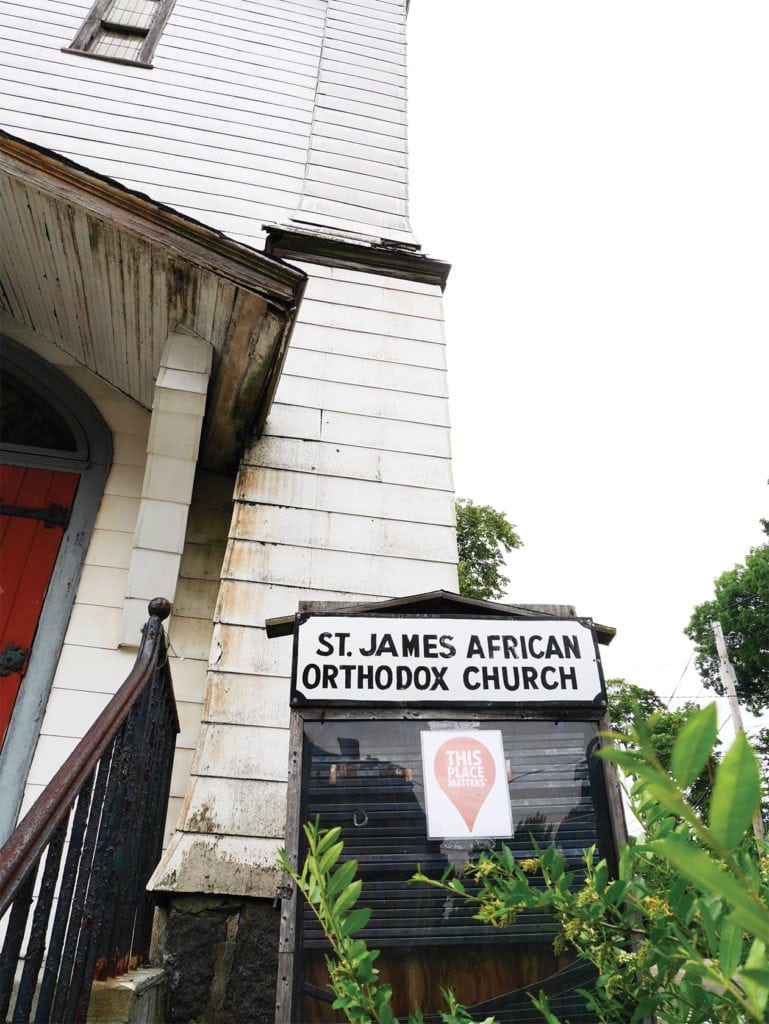
The Boston Landmarks Commission, in a hearing June 12, voted unanimously to accept for further study a community-generated petition to designate the former St. James African Orthodox Church at 50 Cedar Street in Roxbury as a Boston Landmark.
The move gave hope to neighborhood residents, elected officials and historical preservation advocates who have been working to prevent the current owner, City Realty Group, from tearing down the building in order to construct residential condominiums on the site.
In addition to the 26-page official petition submitted to the BLC, which detailed the church’s cultural, historical and architectural significance, an online petition created by the Highland Park Neighborhood Coalition to drum up public support for saving the church drew more than 2,600 signatures in advance of the hearing.
On the neighborhood coalition’s online forum, advocates expressed jubilation after the hearing, which included presentations by Curtis Maxwell Perrin, a neighborhood resident and architectural designer who supplied much of the historical description in the landmark petition, and Barry Gaither, director and curator of the Museum of the National Center of Afro-American Artists.
But the June 12 vote guarantees only that the BLC will look carefully into whether the building merits Landmark designation. The process could take months — and technically, the building owner remains free to destroy the building as soon as the 90-day demolition delay period ends on July 9.
“Everyone recognizes that the 90-day demolition clock is running,” Perrin told the Banner.
An update to the online petition reads, “Keep it up! We are not out of the water yet,” and reminded supporters that in its study, the BLC will be working to determine whether the building has state or national significance as well as local.
BLC Chair Lynn Smiledge confirmed that a property must possess “more than local significance” to be granted Landmark status, and in her view, the building shows promise of meeting this bar, particularly because of its cultural significance.
“Because of its ties to civil rights figures and to the two congregations, it appears there was broader impact than just in Boston,” Smiledge said in an interview.
Site history
The white wood-frame building that sits in a residential area at the corner of Cedar and Hawthorne Streets in the Highland Park neighborhood was built in 1910 by the Norwegian Congregational Church. It was sold in 1955 to the African Orthodox Church, which had ties to Marcus Garvey, the Civil Rights movement and the Pan-African movement to unite African and diasporic black populations.
Arguments in support of the building’s wider cultural and historical significance include its role in serving both Norwegian and Caribbean immigrant populations.
The AOC occupied the site for 50 years before closing in 2015 and selling the building to 5050 LLC, a shell corporation of City Realty.
Over the past two years, the realty firm has presented three proposals for developing the 50 Cedar Street site. The first plan would have retained the exterior facade of the church while adding new construction to create 39 condominium units and 32 parking spaces. That proposal met with resistance because of the density. The second proposal would have preserved the church building, which the firm proposed to rent out, and added condos on what is now a parking lot. According to Perrin, neighbors were skeptical that any congregations or groups would be able to afford to rent the space. Finally, the most recent proposal didn’t include the church building at all.
In April, City Realty moved to gain permission to raze the building. Under the city’s Article 85 process, plans to demolish any building more than 50 years old must be reviewed by the BLC. For this site, the BLC put a 90-day demolition delay in place, allowing time for public comment and consideration of alternative plans. When that delay period ends on July 9, the firm could legally demolish the church building.
City Realty did not respond to repeated requests for comment on its plans for the site and whether it sees any avenue for compromise with church neighbors. The site is currently listed for sale, and the listing features a design rendering that does not include the church building.
Multiple concerns
Beyond religious and cultural history, the Highland Park group sees City Realty’s moves as part of an alarming pattern of development in the area that threatens to change neighborhood character and accelerate gentrification and displacement, as well as to add undesirable density and accompanying parking shortages.
“There are a lot of reasons for people taking action on this,” said Perrin. He noted that a number of former congregants of the church came to the BLC hearing, as well as abutters and other area residents. “There are a lot of factors at play here. There are concerns about fairness, displacement and gentrification. This drew a lot of people because it’s symbolic of what’s happening in the neighborhood.”
In the past, City Realty has been the target of tenant and housing advocate protests in other neighborhoods such as Egleston Square, and in 2014 company representatives were called to appear at a hearing arranged by then-District 7 City Councilor Tito Jackson to address displacement, community stability and the role of corporate landlords in the disruption of neighborhoods.






